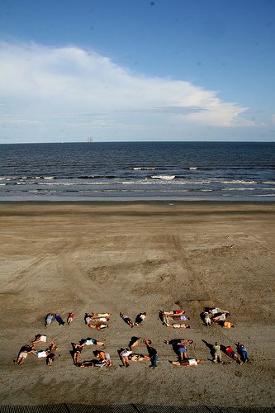

International work
Live from the oil spill


Green Cross CEO Mara Bun interviewed Beth Galante to discuss the prospects for a sustainable recovery in America's climate change impact hot spot - find out more about why community grounded optimism persists through the nightmare of mega environmental disasters.
| About Beth Galante
Beth Galante is a leading voice for Gulf Coast sustainability in the aftermath of Hurricane Katrina and now the BP oil spill. Beth has lived in New Orleans for most of her life. She is Director of the Global Green (Green Cross' US affiliate) New Orleans Office, and she is overseeing Global Green's various projects to rebuild New Orleans as a sustainable model including a Green Resource Centre, the exemplar Holy Cross Project, the Built It Back Green program which gives technical advice and workshops for residents trying to green their homes, and other green rebuilding initiatives including green affordable homes, schools, and neighbourhoods.
Beth was formerly an Assistant D.A. in New Orleans and she taught at Tulane Law School, as the former Deputy Director of the Tulane Environmental Law Clinic. She has been National Law Journal's Runner Up Lawyer of the Year, for groundbreaking work in the field of Environmental Justice. Beth has a Masters of Environmental & Energy Law and J.D. from Tulane Law School. She is currently an Aspen Institute Fellow in its Henry Crown leadership program. |
MB - How does the oil spill feel on the ground?
It's been a punch in the gut - earth shattering at the community and personal level.
Not a single person was untouched by Katrina. But after a few months, it was clear where the damage was done and people started to move back. Recovery began, first in discrete areas. There has been no shortage of setbacks over the past five years. But the community was truly inspired to put this magical place back together. And it's come together so much better! With heart, with passion. There is so much to celebrate.
But then came the spill.
MB - Let's get back to the oil spill - but first can you share your reasons for celebrating the recovery?
Sure - some great things come to mind.
New Orleans is becoming a model coastal city - resilient, designed to adjust to climate change. The community has embraced sustainability at every level. All levels of government encourage energy efficiency and renewable energy. Awareness about the need to withstand wind and water stresses is massive. We are building to prepare for future hurricanes, so sustainability goes hand in hand with resilience at the neighbourhood and policy level.
The next real accomplishment has been in the public education system. New Orleans had a very poorly performing education system when compared to other parts of the US or other developed nations. Our schools were rock bottom before Katrina. The storm destroyed the school system overnight. The rebirth has been awesome. We now have a decentralized, entrepreneurial school system with all kinds of new models emerging (some private, some traditional public, some supported by Universities). Student test scores have improved every year after Katrina.
Sustainability has been a big factor in this equation. Global Green has led a green school infrastructure project - funded by the Bush Clinton Katrina Fund - that has delivered six new LEED accredited schools [LEED accreditation is similar to Australia's Green Star Ratings]. One of these is Louisiana's first LEED Gold school. We are really proud of that - and now green schools are embedded in the system. By legislation, all new schools and school renovations in New Orleans must reach at least "LEED Silver" standard. That's a nation-leading accomplishment.
And it's no surprise that test scores have improved because worldwide studies show that students have better results if they study in places with better light, better air, and lower toxic and other environmental impacts.
The other cause for optimism is governance. Before Katrina, New Orleans and the State as a whole experienced a never-ending stream of corruption enquiries. Our new Mayor has an overwhelming mandate - from black, white, rich and poor residents. We are in a new era of transparent, good local government that has not been seen for generations.
Much of this has been citizen-driven. New Orleans has some of the best local community groups in America, and now finally the government is following the community's lead. For example, a task force including community and local business groups has out forward thirty recommendations for sustainability, and many of these wonderful citizen projects are being supported.
But the best cause for optimism - for sure - was when the Saints won the Superbowl!
MB - So bearing all of that good news in mind - lets go back to the oil spill. How is the community responding?
This is a different kind of disaster. One that does not end. You can't respond by rebuilding a house - there's a feeling of impotence. What do you do as a citizen, as a human being?
New Orleans is not experiencing the brunt of this - but we are connected to coastal neighbourhoods experiencing existential crisis.
The conversation is shifting towards oil independence. How can renewable energy and energy efficiency wean us off America's oil addiction? But the conversation is very challenging, because Louisiana has limited economic diversity. Elected officials are influenced by the oil industry which is hostile towards energy alternatives. There has been limited meaningful exploration of alternatives at the State level - there's a lot of "O-Bashing" (Obama bashing) especially in challenging the moratorium on offshore drilling.
A partisan cloud is descending - just like with the Katrina response. The Bush-bashing back then was not helpful either.
And then on the ground where families confront the oil at the coalface, there's a lot of confusion about what's happening with the clean up, and what the future looks like.
New leaders such as Kindra Arnesen are emerging. Kindra is the Erin Brockovich of the Gulf. She fears a cover up is underway, and that apparent clean up actions are not real. The community is worried about healthy breathing and healthy ecosystems - not to mention the clamp down on tourism and fishing.
MB - How is Global Green - a national environment group with the largest office in New Orleans (and the only one dedicated to green building/climate change) responding?
On the fourth of July 2010, our Independence Day, Global Green and 65 local business, academic and community groups forming a "Green Collaborative" launched a Declaration of Energy Independence. This addresses the need to transition America's energy mix, shaping clean energy as a viable economic model as opposed to hand-outs to renewable industries.
In addition to playing our part in the clean energy conversation and rebuilding a sustainable and resilient New Orleans, Global Green is taking on four challenges that we think can deliver the most value on the ground right now, working with local community networks:
- Providing humanitarian aid on the ground - using our fundraising to fill gaps such as funding dental care for coastal residents who are severely stressed and are experiencing high levels of broken teeth, and helping families to buy school uniforms.
- Documenting impacts - bringing Hollywood celebrities to document interviews with residents that bring out personal stories - human and wildlife impacts - that can be shared over social media.
- Community empowerment responses - including support for enacting the "Citizen's Advisory Council" provisions of the Offshore Petroleum Act (or OPA). The OPA came into effect after the Exxon Valdez Spill after it became clear that community organizations needed funding support to empower effective community responses. Global Green is supporting a call for $2.5 billion in funding to nurture and empower Gulf community organisations which will to bolster long term responses to the spill. We see this as a moral imperative that will enable the community to shape its future.
- Focus on wildlife destruction - The biodiversity outlook is scary for the Gulf. The sea turtle situation is especially horrific, with people across the world watching incinerated animals as BP burned the oil. It costs $10,000 to rescue, clean and release a sea turtle, and the Kemps Ridley sea turtle is particularly endangered . This is an ancient, magnificent creature, and America's oil addiction could destroy them. Global Green is exploring the potential to partner with high quality educational tourism operators to foster a values shift towards protecting the nesting ground and ocean ecosystems where the sea turtles thrive.
Copyright © Green Cross Australia | Terms & Conditions | Privacy Policy
web design brisbane :: (zero)seven
